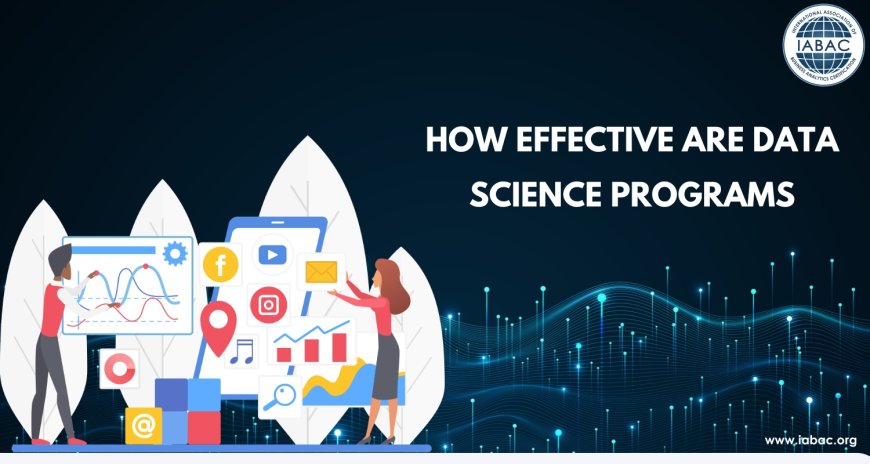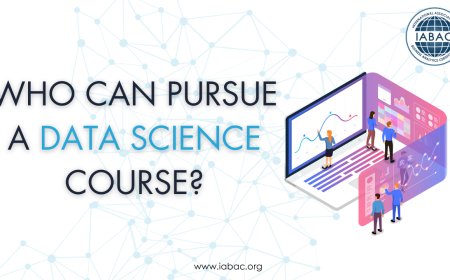How Effective Are Data Science Programs
Discover the effectiveness of Data Science programs. Learn how these courses can enhance your skills and career prospects. Find out How Effective Are Data Science Programs today.

Data science programs have become essential for those looking to excel in business analytics, artificial intelligence, and machine learning. These programs provide thorough training that helps students analyze and understand complex data. Whether you’re pursuing Data Science Certifications, Business Analytics Certifications, or specialized Artificial Intelligence Certifications, the goal is to create experts who can make informed decisions based on data. The effectiveness of data science programs lies in their ability to combine theory with practical skills. Courses cover various topics such as statistics, data mining, and machine learning, preparing graduates to tackle real-world problems confidently. Additionally, the availability of Data Analytics Certifications allows individuals to prove their skills and increase their chances of landing competitive jobs.
Becoming a Machine Learning Expert through these programs opens up various career paths, from large tech companies to innovative startups. As businesses increasingly value data-driven insights, the role of data science programs in shaping the future workforce becomes more important. This article examines the effectiveness of these programs and their impact on career growth in the rapidly changing tech world.
Understanding the Growing Demand for Data Science Skills
The need for data science skills is rapidly increasing. Businesses in every industry are relying more on data-driven insights to make smart decisions and stay competitive. This trend has led to a rise in the popularity of data science programs and certifications, such as the data science foundation Certification, Data Science Developer Certification, Data Scientist Certification, and Machine Learning Expert Certification. Professionals who have these certifications are highly sought after because they can find important information in complex data. They play crucial roles in understanding patterns in data, creating models that predict outcomes, and making business operations more efficient. From healthcare to finance, and from retail to manufacturing, companies are using data science to make their work easier and better.
As technology changes, the need for people who understand data science will only get bigger. Companies aren't just looking for people who can do math but also for people who can turn data into plans that work. If you're just starting your job or looking to move up, taking classes and getting certified in data science can help you find lots of new chances in today's world where data is so important.
Challenges of Different Quality and Outcomes in Data Science Programs
Data science programs vary widely in quality and outcomes, presenting several challenges for both students and employers. Here’s why understanding these differences can be tricky:
-
Different Curriculum Standards: Data science programs often have varying curriculum designs and depth of coverage. Some focus more on theories, while others emphasize practical applications, making it hard for students to choose the right one.
-
Varying Learning Experiences: The quality of teaching and resources can differ greatly among institutions offering data science programs. This difference can affect how well graduates are prepared for real-world challenges and what industries demand.
-
Employer Expectations vs. Program Offerings: Employers looking for data science professionals have different expectations about skills and knowledge. The mismatch between what programs teach and what employers need can make it difficult to find jobs and advance careers.
How Effective Are Data Science Programs in Training Skilled Professionals?
1. Comprehensive Learning: Data science programs cover essential topics like statistical analysis, machine learning, data visualization, and big data technologies. These courses give aspiring data scientists a strong foundation to build their technical skills.
2. Practical Experience: Many data science programs focus on hands-on learning with real-world projects and datasets. This practical approach helps students apply what they learn in theory to solve actual problems, preparing them well for their careers.
3. Industry-Relevant Skills: Effective data science programs teach skills that are highly valued in the job market, such as Python and R programming, using data tools, and advanced analytics techniques.
4. Networking Opportunities: These programs often organize events where students can meet professionals in the industry. Building a professional network early can help students find jobs and advance their careers.
5. Career Support: Many institutions offer services like resume workshops, interview coaching, and help with finding jobs. These services assist students in showcasing their skills effectively to potential employers.
6. Adaptability and Innovation: Data science is always changing, and good programs keep up with new technologies and methods. This ensures graduates stay competitive in the job market.
7. Credibility: Graduating from a respected data science program boosts a professional's credibility and can open doors to job opportunities at top companies. Well-known programs have good reputations in the industry, which benefits graduates.
8. Continuous Learning: Effective data science programs encourage graduates to keep learning and improving their skills. They promote staying updated with industry trends, earning certifications, and being part of professional communities.
These points show how data science programs prepare skilled professionals by combining theory with practical skills and promoting lifelong learning.
Assessing Data Science Programs: Are They Effective?
Data science programs are crucial for anyone looking to enter the field of data analytics. Here’s what to consider when evaluating how well these programs work:
1. Curriculum Relevance: Good data science programs teach courses that match what’s needed in the real world. They cover topics like machine learning, big data analytics, and statistical modeling, giving students practical skills.
2. Faculty Expertise: The teachers in data science programs need to know their stuff. It helps when they have experience working in data science. That way, they can share real insights and guide students better.
3. Hands-on Learning: Students need to get hands-on experience. Programs that offer projects, internships, or chances to work with companies let students practice what they learn in class.
4. Industry Recognition and Partnerships: Some data science programs are well-known in the industry or partner with big companies. This can mean more resources for students and better chances of finding a job later.
5. Career Support Services: Good programs help students with things like making a resume, finding a job, and meeting people in the field. This support makes it easier for students to start their careers.
6. Student Success and Alumni Feedback: Hearing from current students and graduates can show how well a program works. If graduates are finding good jobs and doing well in data science, it’s a good sign.
7. Continuous Learning and Updates: Data science changes fast. Programs that keep up with new technology and offer chances for students to keep learning after they graduate are more valuable.
when you look at data science programs, think about the classes they offer, the teachers, how much students get to do real work, and how well graduates do afterward. Programs that do these things well prepare students to succeed in data science. For more insights into data science programs and their effectiveness, visit IABAC.
































